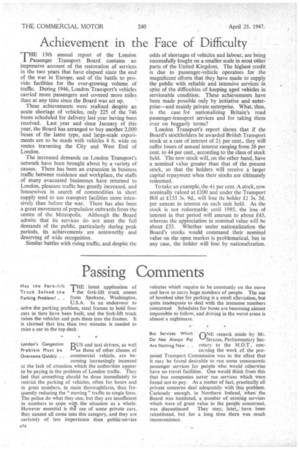Achievement in the Face of Difficulty
Page 26

If you've noticed an error in this article please click here to report it so we can fix it.
THE 13th annual report of the London Passenger Transport Board contains an impressive account of the restoration of services in the two years that have elapsed since the end of the. war in Europe, and of the battle to provide facilities for the ever-growing volume of traffic. During 1946, London Transport's vehicles carried more passengers and covered more miles than at any time since the Board was set up.
These achievements were realized despite an acute shortage of vehicles, only 225 of the 746 buses scheduled for delivery last year having been received. Last year and since January of this year, the Board has arranged to buy another 2,000 buses of the latest type, and large-scale experiments are to be made with vehicles 8 ft. wide on routes traversing the City and West End of London.
The increased demands on London Transport's network have been brought about by a variety of causes. There has been an expansion in business traffic between residence and workplace, the staffs of many evacuated businesses have returned to London, pleasure traffic has greatly increased, and housewives in search of commodities in short supply tend to use transport facilities more intensively than before the war. There has also been a great movement of population outwards from the centre of the Metropolis. Although the Board admits that its services do not meet the full demands of the public, particularly during peak periods, its achievements are noteworthy and deserving of wide recognition.
Similar battles with rising traffic, and despite the odds of shortages of vehicles and labour, are being successfully fought on a smaller scale in most other parts of the United Kingdom. The highest credit is due to passenger-vehicle operators for the magnificent efforts that they have made to supply the public with reliable and intensive services in spite of the difficulties of keeping aged vehicles in serviceable condition. These achievements have been made possible only by initiative and enterprise—and mainly private enterprise. What, then, is the case for nationalizing Britain's road passenger-transport services and for taking them over on beggarly terms?
London Transport's report shows that if the Board's stockholders be awarded British Transport stock at a rate of interest of 2 per cent., they will suffer losses of annual interest ranging from 26 per cent. to 44 per cent., according to the class of stock held. The new stock will, on the other hand, have a nominal value greater than that of the present stock, so that the holders will receive a larger capital repayment when their stocks are ultimately redeemed.
To take an example, the 43 per cent. A stock, now nominally valued at £100 and under the Transport Bill at £133 3s. 9d., will lose its holder £1 3s. 5d. per annum in interest on each unit held. As the stock is not redeemable until 1985, the loss of interest in that period will amount to about £45, whereas the appreciation in nominal value will be about £33. Whether under nationalization the Board's stocks would command their nominal value on the open market is problematical, but in any case, the holder will lose by nationalization.












































































